Reviewing this world’s oceans is a tall task, but let it be known that Sprites and Dice doesn’t back down from a challenge—wait, we’re review a game called Oceans? That does sound a whole lot easier. During our month-long charity streaming for The Trevor Project we gave out many prizes, among them the ability to request reviews. Oceans, by North Star Games, was requested, and I am here to deliver!
If you’ve read my review of the Evolution education build, you know that I’ve got a soft spot for the Evolution games. It’s a real joy to play titles where mechanics mirror theme so tightly, bringing their subjects to life on our tabletops without even the faintest want of flavor text. And while I might be spoiling a bit up front, I think I can say straight away that this game feels in every way like the successor to the crown that Evolution has wrought. Let’s have a look at how Oceans takes that Evolution formula into a new era!
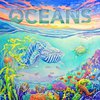 Oceans
Oceans
Designer: Nick Bentley, Dominic Crapuchettes, Ben Goldman, Brian O'Neill
Publisher: North Star Games
Format: Card Game, Hand Management, Tableau Building
Number of Players: 2 - 4
Play Time: 60 - 90 minutes
Price: $49.99
Copy purchased by reviewer
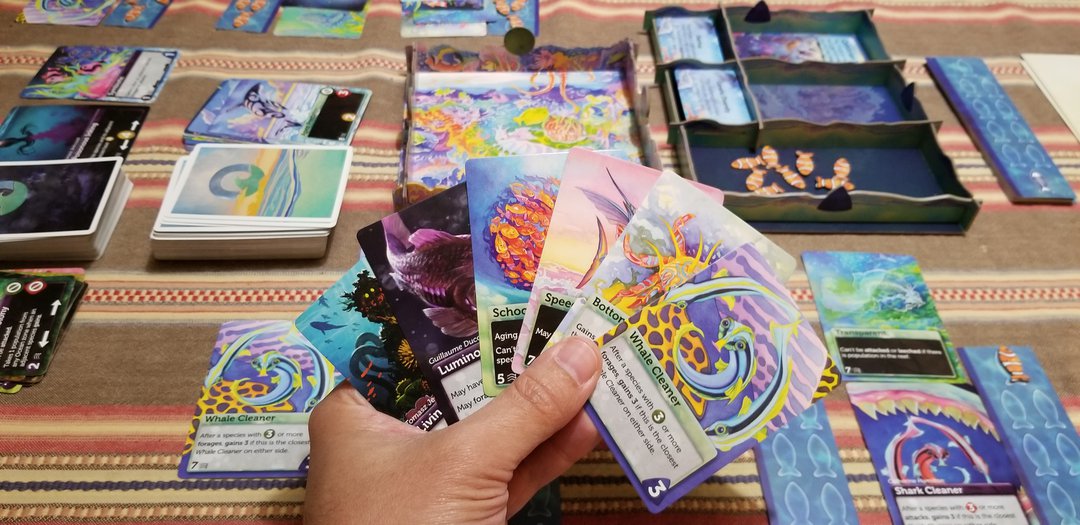
So much color! In the game. Ignore my questionable taste in tablecloths.
Taking The Plunge
I’ll be honest with you. I haven’t bought many new board games since the global pandemic took my public game nights away. I just can’t muster the same level of enthusiasm over growing my game library when I know it could be months or even another year until I have the right group of people to get certain games played. I think it’s very telling that, during this time of extremely targeted acquisitions, Oceans was one of my few purchases. I’ve had my eye on this game ever since I started reviewing North Star’s wonderful titles, back when I looked at the then new Taverns of Tiefenthal. After some research of my own, the purchase was an easy move, and now I’m glad to be able to share this wonderful game with you.
In Oceans, much as you’d expect from an Evolution game, players will play from a hand of cards to create new species in front of them. Each card will give these species new adaptations and abilities, some designed around defense while others focus on feeding. And food, as ever, is where it’s at! Each food token you claim is worth a point at game’s end. Unlike past iterations of this series, though, points don’t go straight into a little scoring bag. Food tokens are moved onto the population track of the species doing the feeding, and as population “ages” in the last phase of players’ turns some of those tokens are removed to your permanent, safe score area (population on species at game’s end is still counted, but as we’ll see this isn’t the best place to leave your points).
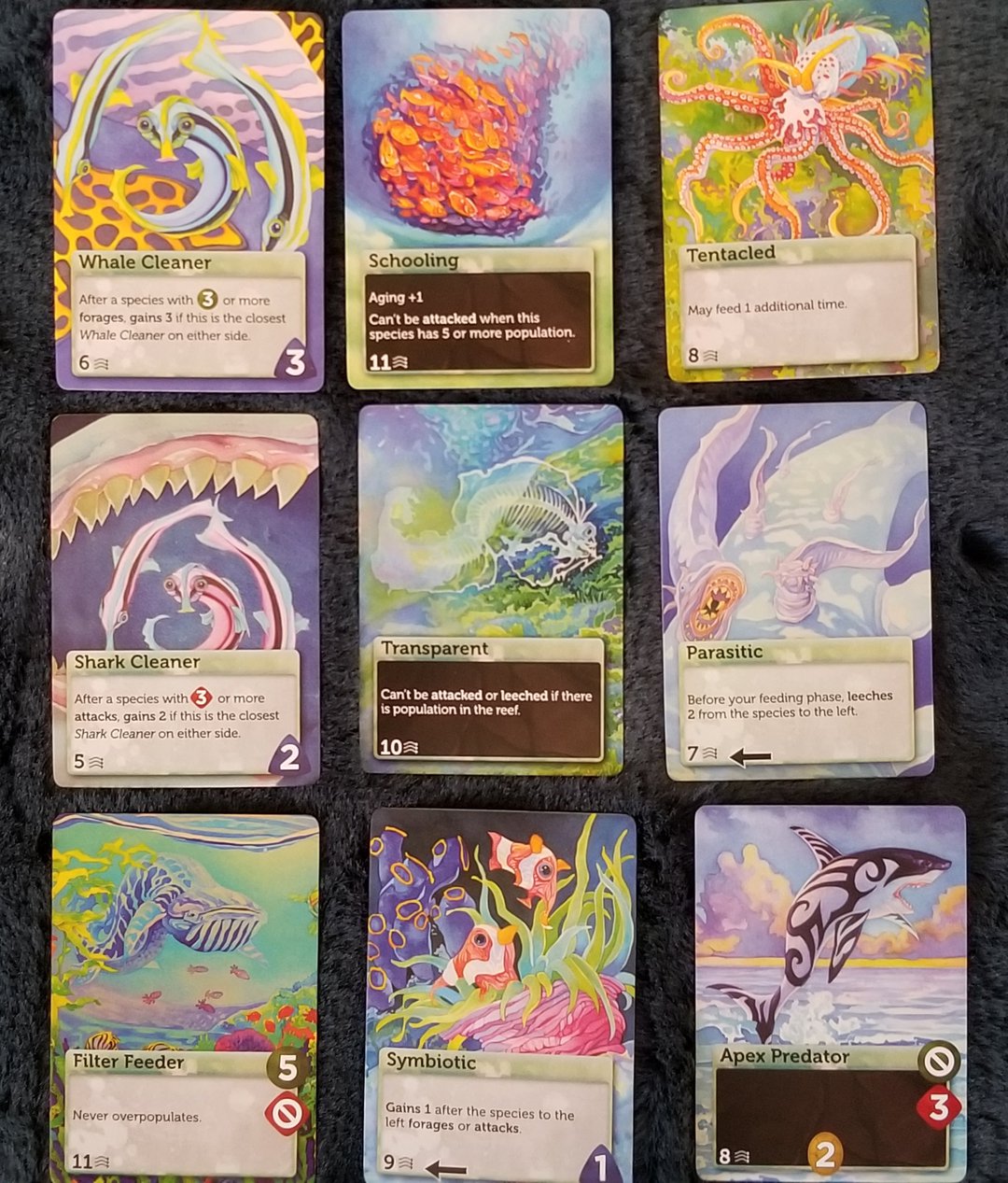
The basic cards in the Reef deck provide a stable, familiar base to build with. And they look absolutely fantastic!
A few things have changed from the classic formula, for the better in my opinion. Attack and defense no longer factor in how large species body size is; instead, predation is determined by a simple attack versus defense number comparison, barring special powers that prevent attacks under certain circumstances. Damage is taken out of the defender’s population, that track we mentioned where species put the food points they’ve claimed. This means that if a large filter feeder grabs a ton of points and isn’t careful, a cunning predator can take those points for their own on the very next turn. The food chain is delicious like that! Lastly, if a species ever feeds so much that its population hits the max space on the population track, again barring special exceptions via cards, that species has expanded beyond what it’s capable of sustaining and immediately drop back to 5 population, depositing losses back into the communal board areas.
I really enjoy these changes for several reasons. Firstly, I love how this streamlines the classic Evolution formula. No longer do players have to worry about both defense and the body size of their species in order to figure out predation. One of the things I hate seeing at my table is someone gleefully set to attack another species only to be met with “you can’t because XYZ you forgot about.” Yes, everything is displayed on the table for all to see at all times, but mental overhead is a real consideration. Evolution has always been a quick to teach, easy to play, harder to master kind of title, and anything that reduces mental gymnastics, letting players get to the action and strategy faster, is a winner in my rulebook. It’s much more immediately clear if a species can be attacked at a glance, lending Oceans to be even more that quick to teach, easy to play, still hard to master title it’s always aimed to be.
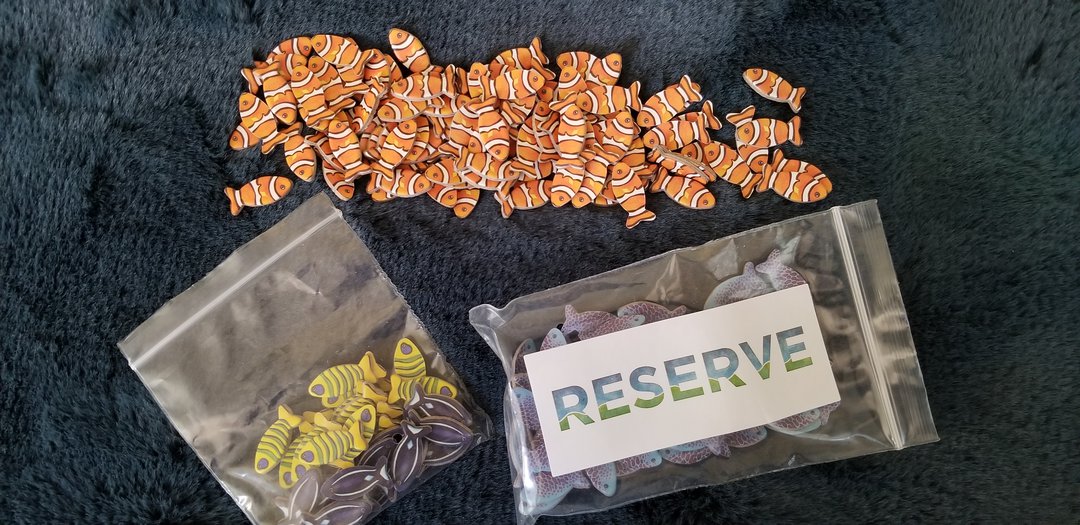
The design of the fish pieces let you set up games without counting individual fish for player counts. The new standard for setup is set! Pay attention other publishers!
Then there’s the population track on each species, along with aging and score. You’ll quickly learn that having the biggest, most efficient feeder in the sea isn’t going to win you the game (unless you and your opponent’s species are having an eating contest). All species exist in an ecosystem together, and just like in a real ocean there may be something bigger waiting out there to take a bite out of your latest, greatest feeding juggernaut. As with body size, I love that population is something that’s been streamlined from a separately buildable stat on a species board into a sort of combination size marker and point storage bin. If you eat too much, your species can’t hold onto all those points as it overpopulates. If you don’t have additional methods to age the population into your score area or protect it, all those points are up for grabs. And at a glance it’s easy to see if you have enough population to trigger a card’s special powers. Rolling all of that into one simple track is a brilliant move that speeds the game along even more!
And that pace. It’s fantastic!
I quite like how this game acknowledges that actual oceans are crazy places filled with absolutely bonkers animals! As you diversify your species, you begin seeing just how much this game tosses power into your hands and caution to the—well, I’d say winds but we’re underwater here. Currents? Let’s go with currents. You start out with some simple creatures, some feeders and some parasites perhaps. Maybe there’s a predatory something lurking, chomping down on smaller creatures every other turn. Fast forward about ten minutes and suddenly species are using camouflage to hide, using schooling behavior to avoid larger predators, maybe even harnessing bioluminescence. And that big thing lurking? It’s turned into a Sea-Rex with a mouth the size of a warehouse. All the while the fantastic artwork on the cards, as well as other components, breathes life into each creature or tasty morsel. This game is just as exciting to play and behold as it is thoughtful, clever, and devious.
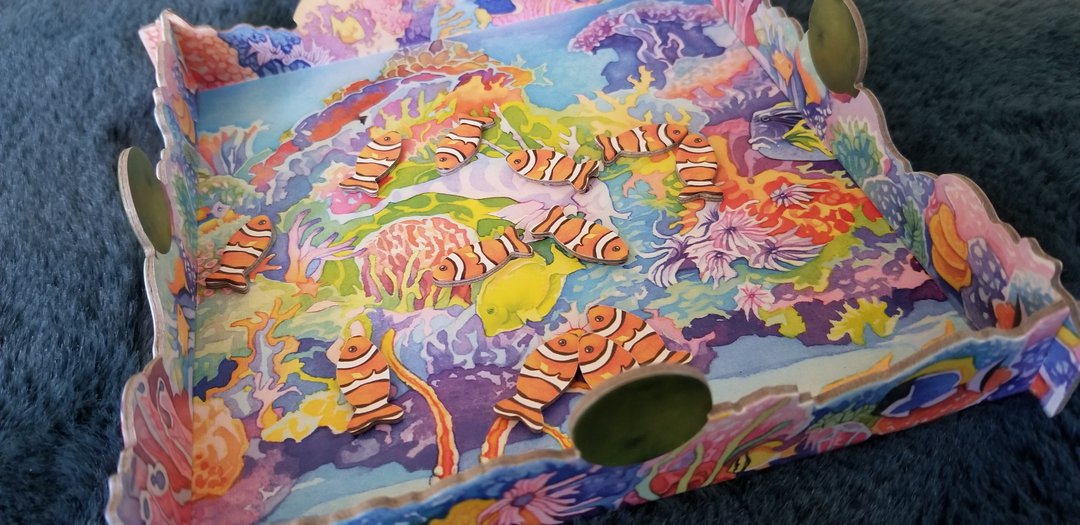
If I had one complaint, it would be that the Reef board, while beautiful, is very busy. It's sometimes hard to see just how many fish are hiding in it.
A Tale Of Two Decks
Let’s talk cards, because they’re at the heart of this game. To start off, and for most of the game, you’ll be drawing from a standard deck that includes multiple copies of the same cards. These are your base, the bones or rough exoskeleton that you’ll build your species around. By itself this Reef deck is perfectly functional; the manual even recommends you teach first time evolution players by playing with only this deck for the first game. These cards will get you giant filter feeders, your first predators, parasites to mooch of the success of others, and a few handy defensive adaptations. At the end of your turn, you’re always allowed to discard as many of these cards as you’d like before filling your hand back up to six.
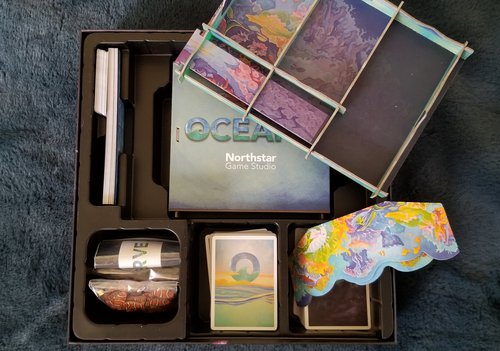
Then there’s the Deep deck. Each card in the Deep is unique. Some are simply better versions of Reef cards, but the vast majority are strange and beautiful powers. And yes, before you ask, strange is a perfect word for them. They’re not necessarily overpowered so much as they are weird and specific. It takes, for example, a clever mind to use the Big Brain card, an adaptation that lets you stack an unlimited number of traits on a species at the cost of needing more and more food to support them. You could literally evolve a species past the point at which it could feed itself! You see cards like this constantly and are always going through a rotation of thoughts like: “how is this card not BROKEN,” “wait it’s weird and not as useful as I thought,” and finally “but what if I could figure out a way to make this work.”
But the brutality doesn’t end there. Where do we start? How about that to play Deep cards you have to pay precious points from behind your player screen? I’m normally a pretty considered player of games (ask Wyatt or Eric if you don’t believe me) but give me a system where I can spend victory points for cool powers and I will take gasoline and a match to my plans. I can’t help it! Everything just looks cool! I may have a problem. Then there’s the fact that you can’t discard Deep cards like you can with Reef cards before refilling your hand each turn. The more you take, the more you clog your hand if you don’t play them. Refer back to my dilemma with the first drawback of Deep cards and you truly understand my struggle. I mean, I should get them out of my hand right? It’s not my fault I drew so many. I blame North Star for making them so tempting. It’s a vicious cycle for me when I play this game and I love it.
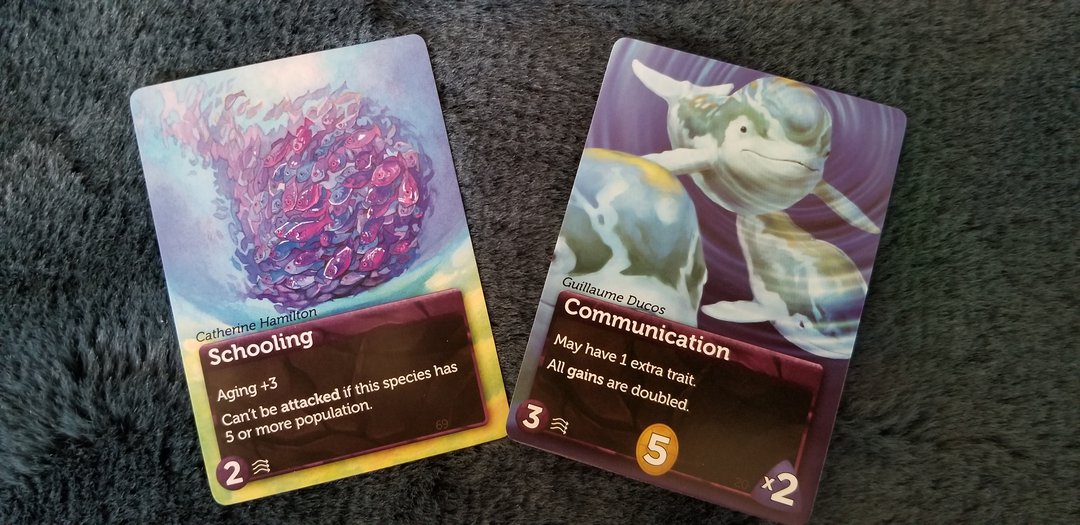
Some Deep cards are just better versions of Reef cards. The rest are unique. All of them are gorgeous, though!
Thriving Ecosystem
I said it at the start of this review, but I’ll say it again. Oceans has an absolutely fantastic ecosystem of play and counterplay that you evolve your strategies within. You may have a preferred method, but you’ll soon be forced to adapt to the actions of your friends. I, for example, am often irked by big stacks of point sitting on the population tracks of opposing species, so I often make at least one predator early on. This often leads to a chain of events in which other species find ways to present less of a target, necessitating new predation traits on my hunter or leech strategies to pick off what I can around the fringes. It’s entirely possible that over-focus on one species can spell the doom of the entire ecosystem on your side of the table. Then again, nothing stops you from creating your own species to feed others you’ve made. If you leave a few extra population on your species to share amongst one another they’ll be safe, right?
And yet, despite the swing of the Deep cards, the game never becomes unmanageable. With the core of most species being from the Reef deck, there’s always a certain measure of consistency that keeps things just familiar enough for you to plan ahead. Don’t get me wrong, you will still have some wild trait combinations on your species that lead to all kinds of jokes around your table, but it’s nice to know that from a mechanics standpoint the game remains accessible even as it hands you yet another bizarre power from the deep.
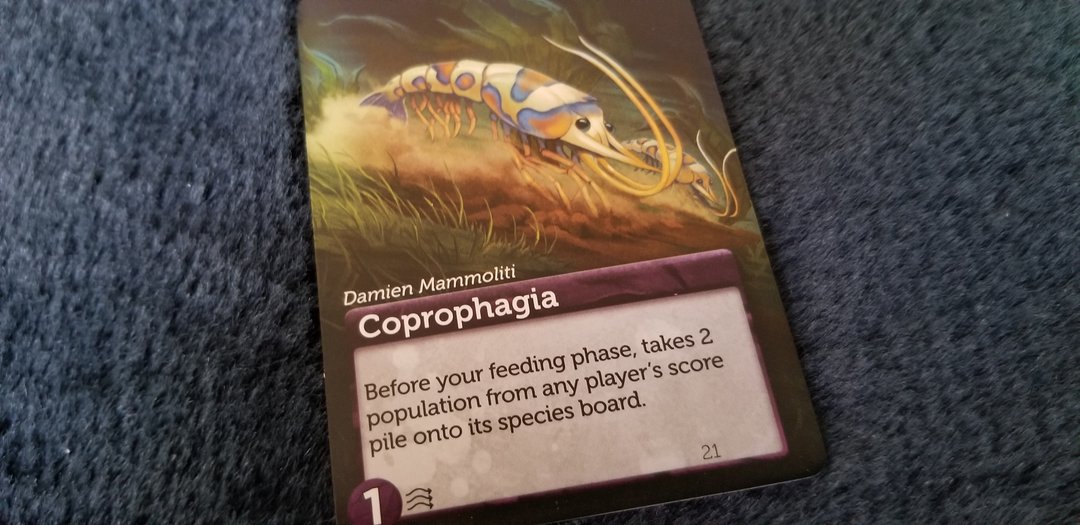
"Points in Oceans are apparently poop. It is canon." -Eric
Of note, this game is also super respectful of your time. As I play more and more games, my tolerance for long setup and teardown wanes. Personally, I want more games that set up and clean up quickly so we can get to the good stuff: the playing of the game and enjoyment of time spent with friends and family. Oceans nails this with minimal overall components and a coding system for the fiddly ones in a way that is just pure genius. Seriously, more games should pay attention here when possible. The fish tokens are color-coded so you know at a glance, by player count, exactly which little baggies to dump out during setup. The rules also specifically instruct you to divide them into roughly equal piles before drawing some cards to mix things around just a little more. Oceans isn’t concerned that there are exactly 25 fish in each ocean zone. Just get it good enough and get going! Trust me when I say that in just one turn it absolutely will not matter. And if you really want it to be perfectly equal, you do you! Nothing stops you from counting if you really want. I love that the game tells me I don’t have to, though.
At the time of writing, we don’t yet have our local game nights back, but I can tell you with certainty that Oceans is going to be a staple in my game night bag for sure. It’s so easy to teach and play, easy to set up and pack away, and it offers such wonderful interactions and depth of strategy (pun not intended though I’ll take it), along with a nice obscuring of the leader by keeping points hidden, that it’s easy to see it being played with a multitude of different friends. There are added events that you draw for each game, adding new conditions to play around, ensuring things stay a little extra fresh while allowing you to see them at setup so you can still plan around them. Hard feelings are quickly forgiven as people try their hardest to keep track of the perceived leader, tweaking their strategies around what they can still see such as the last big feeding frenzy. Honestly, the only folks I can’t really recommend this game for are the ones who don’t like direct player interaction, but you knew that already. If you’ve been a fan of the Evolution series of games, you really should make sure you grab a copy of Oceans. And if you’re on the outside looking in, deciding to try an Evolution game for the first time, I think there’s no better title to start with than this.
Jump on in. The water’s perfect!